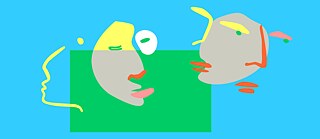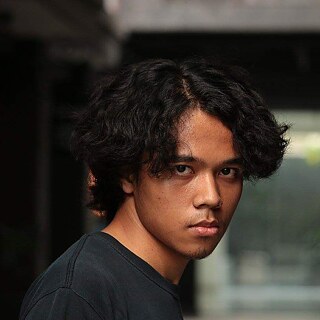Arthouse Cinema - Harun Farocki
How to Live in the FRG: Fear and Alienation

Farocki assembles his film footage as collages, almost without narration, such that only a series of ideas strung together remains.
Answering Randall Halle’s question about the film Leben BRD (1990), Harun Farocki said he intentionally chose the title How to live in the FRG (the official English name for West Germany is “Federal Republic of Germany”) because it sounded like the heading of a “user manual”. Farocki jokingly explains that the title he chose is probably the only text that the commodity economy system has written about itself and possibly also the only capitalist literature on capitalism (Halle, 2003). If one day you buy an electronic device that you unfortunately do not know how to use, you should simply rummage through all the packaging material and scour the inside of the box until you find the instructions that will save you. Modern society organizes itself with predictive logic and sets up life-saving safety nets for all areas of life.
The problem is just that this way of constructing the world does not always run smoothly from the start. If we look closely, what Farocki is trying to convey with the 32 scenes of his film is nothing more than a world with gaps. One example is West Germany with its “economic miracle” as a world economic power during the Cold War. Farocki reached for his camera two years before the fall of the wall that divided Germany into two opposing political and economic entities. There may have been problems in the subconscious mind of West German society at the time, such as the fear that arises in the interpretation of history.
The life of man: between certainty and acceptance
Farocki assembles his film footage as collages, almost without narration, such that only a series of ideas strung together remains. First he combines physical work and machine work as simulation modes of the virtual world. Sex, for instance, is simulated on the user interface of a video game. The individual fragments are then arranged as if they followed the production and reproduction cycle of safety nets for human life: from the scene in which a midwife shows how she handles the birth of a child to the attempt of an adult to overcome his fear of the uncertainty of life.Man lives from assumptions, from (product) demonstrations and from the written instructions of user manuals, which in the meantime have evolved into a life manual, and this means: mechanization. People are like awkward machines. Viewed through Farocki’s camera, Germany is a machine that tests the shelf life of products, durability; a machine continually stamps mattresses, a washing machine is subjected to permanent shocks, a vacuum cleaner constantly hits a corner of the room, a desk shelf is subjected to strong impacts, a car door is repeatedly opened and closed, a cabinet door slammed shut.
The future can no longer be seen as a series of random possibilities, since it is controlled by data from the past. The data is collected in the text of the life manual, from which the coordinates are created, between which an individual must move in the hope that there will be no fatal accident—which can sometimes have trivial features. Examples are the driving simulation of a car in which the circumstances of a main road are virtually simulated; video recordings of police officers reacting to domestic disputes and ending them; an application for a job and sheets of paper with a fear diagram. Everyone will agree that instructions which make life easier for many people have been tested beforehand, at least to minimize possible risks and to determine the effectiveness of the instructions themselves. Verifiability is an important principle in this life manual. Suppose you apply for a job and are asked to submit a certificate verifying your training in order to meet the requirements for employment. The only objective is to prove that your abilities have already been checked.
However, when the entire episode was put together, a strange feeling came over you that challenged you to question this way of life in a deeper way. If the fear of the masses is simulated within public institutions, the question arises as to whether these simulations will ultimately help to overcome the fear successfully or whether they will trigger other fears.
Learning-play (Lehrstück): critically reflecting on our daily problems
In order to critically reflect on the way of life of West German society, Farocki made use of the learning-play, or pedagogical approach of the theatre according to Brecht, on which he based his work several decades ago. Brecht translated Marxist thought for the formulation of his dramaturgical theory, analyzed strategies for how theatre could be re-tooled as a social institution, and defined New Drama as the fundamental concepts of his theatre.As Charlene Marie Guy in her dissertation Lehrstück und Schaustück: The Unity of Brecht’s Drama (1993) explains, Brecht criticizes Aristotelian drama as an illusion of reality that hinders rational-critical thinking and makes it a cultural product. He resisted this with the dramaturgical means of the alienation effect. The alienation forms the basis for shaping dramatic experiences. The principle is to tear down the fourth wall that separates art from life. Real objects and aesthetic representations go hand in hand with the laws of reality that determine the life processes or social causalities. One way in this direction is relocating the “stage” into public space, which is in direct contact with society—theatre thus becomes a means of collective learning (Guy, 1993: 11-27).
The pedagogical approach of the learning-play does not mean that a certain ideology is applied to it but rather that it works via the process of “un-learning” or “losing”, which moves the actors to reflect critically on everyday behaviors and ways of thinking, which usually occur unconsciously (Guy, 1993:32). Through performative action, the actors gain something of what Farocki describes as a “theatre play whose curtain never rises”. He is referring to a statement by Brecht according to which in a learning-play the actors learn from the process they go through when they assume the role to be played. Learning is thus about the process and not about the result. The alienation effect conceived by Brecht was adapted into the medium of film by means of the principles of montage as aesthetic representations that serve to awaken the illusion of real objects or real events that the actors experience.
The fear of the masses as commodity
Farocki emphasizes the alienation effect tactically, especially in the final scene, when he juxtaposes the behind the scene of an insurance company and the paradox of the fear of the masses with which the West German society is confronted. Insurance brokers are trained to show you a future in which all risks can be exploited from the outset. It’s as if you have a disease that you don’t or never will have. You believe that when you sign the insurance policy you are in a system that protects you. On the other hand, those outside this system will continue to live in uncertainty about their future. With this type of business model, it is precisely the company that gains from the uncertainty that you are afraid of. Before the risk occurs and you assert your rights, you are obliged to continue to pay your premiums. You may not notice it at all, because your fear is traded like a commodity in a way that you can understand.I cannot avoid such a fatalistic view, because Farocki’s line of thought leads the audience to conclude that the sustainability of such life systems is actually supported by a soft framework that fills the gaps so quickly and adaptively. It may take some sharpness or a little leisure to play with the camera to realize that the construction or design of modern human life looks rather strange.
Author
